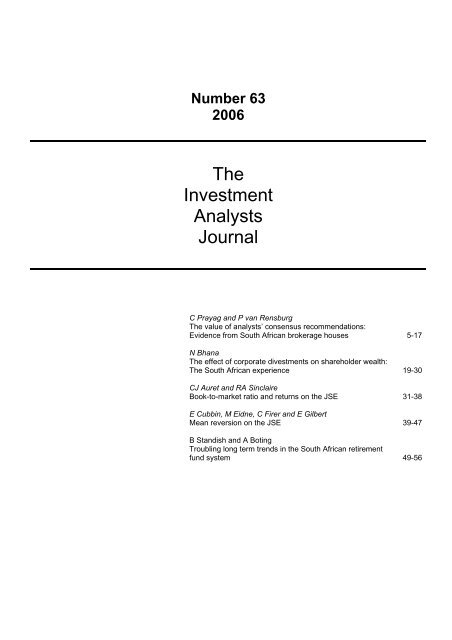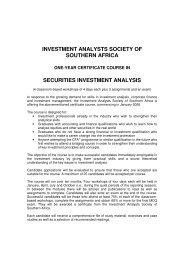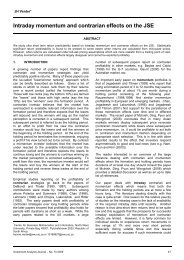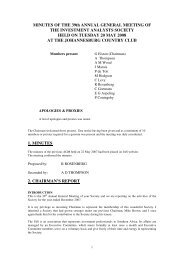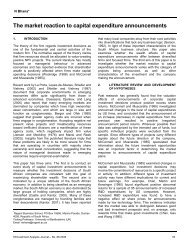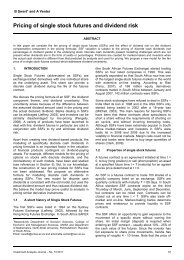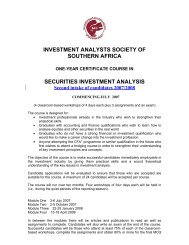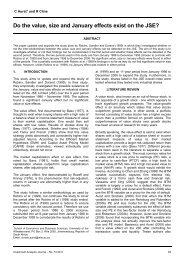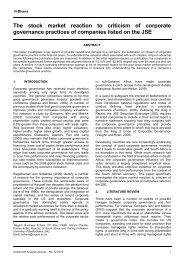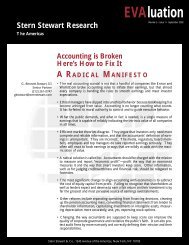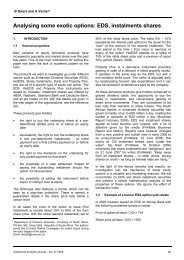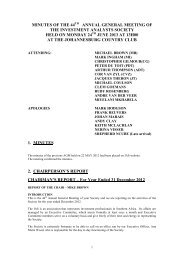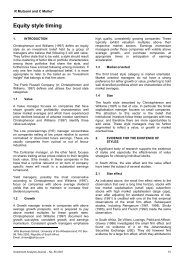The Investment Analysts Journal Number 63 - 2006
The Investment Analysts Journal Number 63 - 2006
The Investment Analysts Journal Number 63 - 2006
Create successful ePaper yourself
Turn your PDF publications into a flip-book with our unique Google optimized e-Paper software.
<strong>Number</strong> <strong>63</strong><br />
<strong>2006</strong><br />
<strong>The</strong><br />
<strong>Investment</strong><br />
<strong>Analysts</strong><br />
<strong>Journal</strong><br />
C Prayag and P van Rensburg<br />
<strong>The</strong> value of analysts’ consensus recommendations:<br />
Evidence from South African brokerage houses 5-17<br />
N Bhana<br />
<strong>The</strong> effect of corporate divestments on shareholder wealth:<br />
<strong>The</strong> South African experience 19-30<br />
CJ Auret and RA Sinclaire<br />
Book-to-market ratio and returns on the JSE 31-38<br />
E Cubbin, M Eidne, C Firer and E Gilbert<br />
Mean reversion on the JSE 39-47<br />
B Standish and A Boting<br />
Troubling long term trends in the South African retirement<br />
fund system 49-56
INSIDE FRONT COVER PAGE<br />
ABSA<br />
INSIDE BACK COVER PAGE<br />
ABSA<br />
2 <strong>Investment</strong> <strong>Analysts</strong> <strong>Journal</strong> – No. <strong>63</strong> <strong>2006</strong>
<strong>Investment</strong> <strong>Analysts</strong> Society<br />
of<br />
South Africa<br />
Executive committee<br />
M F Brown (Chairman)<br />
G A Elston (Deputy Chairman)<br />
W H Bowler<br />
K L Bright<br />
P A Coningsby<br />
N Chadehumbe<br />
FJ Reuvers<br />
P R du Toit<br />
A D Thompson<br />
A M Wood (Alternate)<br />
<strong>The</strong> <strong>Investment</strong><br />
<strong>Analysts</strong> <strong>Journal</strong><br />
<strong>Number</strong> <strong>63</strong> - <strong>2006</strong><br />
ISSN: 1029-3523<br />
Editorial policy<br />
<strong>The</strong> <strong>Investment</strong> <strong>Analysts</strong> <strong>Journal</strong> publishes significant new research in finance and investments. <strong>The</strong> journal seeks<br />
to establish a balance between theoretical and empirical studies. Papers written in any areas of finance,<br />
investment, accounting and economics will be considered for publication. All contributions are welcome but are<br />
subject to an objective selection procedure to ensure that published articles answer the criteria of scientific<br />
objectivity, importance and replicability. Readability and good writing style are important. No articles which have<br />
been published or are under review elsewhere will be considered. <strong>The</strong> editors reserve the right to make the final<br />
decision with respect to publication.<br />
Editorial committee<br />
Prof C Firer (Joint Editor), University of Cape Town<br />
Prof E van der Merwe Smit (Joint Editor), University of Stellenbosch<br />
Prof M Ward, University of Pretoria<br />
<strong>The</strong> opinions expressed in this journal by contributors do not necessarily reflect those held by either the Society or<br />
the editorial committee.<br />
Enquiries concerning the journal should be addressed to <strong>The</strong> <strong>Investment</strong> <strong>Analysts</strong> Society of Southern Africa, PO<br />
Box 131, Ferndale, 2160. Tel. (011) 791-0105. Fax (011) 791-0107. Email: iassa@iafrica.com<br />
Website: http://www.iassa.co.za<br />
Single copies R57,00<br />
Annual subscription (two copies) R114,00<br />
(VAT inclusive)<br />
Index of past issues<br />
An index of all previous issues of the <strong>Journal</strong> can be found by clicking the <strong>Journal</strong>’s link on www.iassa.co.za.<br />
<strong>Investment</strong> <strong>Analysts</strong> <strong>Journal</strong> – No. <strong>63</strong> <strong>2006</strong> 1
2 <strong>Investment</strong> <strong>Analysts</strong> <strong>Journal</strong> – No. <strong>63</strong> <strong>2006</strong>
Sanlam Capital Markets/IAS Award<br />
for the best article published annually in the<br />
<strong>Investment</strong> <strong>Analysts</strong> <strong>Journal</strong><br />
This prestigious award is sponsored by Sanlam Capital Markets.<br />
<strong>The</strong> winners of the award for 2005 will be announced at the Gala Dinner to be hosted by the <strong>Investment</strong><br />
<strong>Analysts</strong> Society in June <strong>2006</strong>.<br />
Previous award winners<br />
1998 Professor Dave Bradfield and Dr Ralf Wandmacher<br />
1999 Professor Colin Firer and Professor Heather McLeod<br />
2000 Ms Eleanor Fraser and Professor Michael Page<br />
2001 Professor Narendra Bhana<br />
2002 Professor John Hall and Mr Sollie Millard<br />
2003 Professor Narendra Bhana<br />
2004 Mr Chanden Prayag and Professor Paul van Rensburg<br />
ABSA GROUP LIMITED, who were announced as the Overall Winner at the IAS Best Reporting and<br />
Communications Award at the IAS dinner held in 2005 have generously sponsored this issue of the<br />
<strong>Journal</strong>, together with the following firms who have presented to members of the IAS, so far, this<br />
year. Our thanks are due to them all.<br />
ABIL<br />
ABSA GROUP<br />
ACC-ROSS HOLDINGS<br />
AFRICAN RAINBOW<br />
AFROX<br />
ALEXANDER FORBES<br />
ALTECH<br />
AMECOR<br />
ASTRAPAK<br />
BRAIT<br />
DATACENTRIX<br />
DATAPRO<br />
DATATEC<br />
DISCOVERY<br />
E O H<br />
ELLERINE<br />
ENALENI<br />
FRONTRANGE<br />
GOLDFIELDS<br />
GRINDROD<br />
HUDACO<br />
HYPROP<br />
ILIAD<br />
IMPERIAL<br />
INVESTEC<br />
LIBERTY<br />
METBOARD PROPERTIES<br />
MITTAL<br />
MR PRICE<br />
MUTUAL AND FEDERAL<br />
NEDBANK<br />
SANLAM<br />
SEKUNJALO<br />
SPAR GROUP<br />
STANDARD BANK<br />
STEINHOFF<br />
TIGER BRANDS<br />
TONGAAT<br />
VERIMARK<br />
<strong>Investment</strong> <strong>Analysts</strong> <strong>Journal</strong> – No. <strong>63</strong> <strong>2006</strong> 3
This issue in brief<br />
<strong>The</strong> value of analysts’ consensus recommendations: Evidence from South African brokerage houses<br />
This study investigates the value of analysts’ consensus recommendations on firms listed on the JSE from March<br />
2000 to April 2003. <strong>The</strong> equally weighted return performance of analysts’ consensus buy, hold and sell<br />
recommendations as well as the effect of transacting on changes in those recommendations is assessed. Raw<br />
returns, market-adjusted returns and risk-adjusted returns are examined.<br />
It is found that if an investor strictly follows analysts’ consensus recommendations, only the buy recommendations<br />
result in significant abnormal returns as estimated under a two-factor arbitrage pricing theory (APT) model. <strong>The</strong><br />
hold and sell recommendations yield insignificant results under all measures of performance. Furthermore, the<br />
number of sell recommendations is very small representing only 3% of the sample. Examining the effect of<br />
changes in recommendations, over a two-month holding period shares with a downgrade from a hold to a sell or<br />
from a buy to a hold achieve significantly negative alphas. In contrast, the abnormal returns of the upgrade<br />
portfolios are not significantly different from zero. It appears that investors can benefit to a greater extent by acting<br />
on downward changes in analysts’ consensus recommendations than on the level of recommendations<br />
themselves.<br />
<strong>The</strong> effect of corporate divestments on shareholder wealth: <strong>The</strong> South African experience<br />
This study investigates the effect of voluntary sell-offs on the share returns of 58 sell-offs involving companies listed<br />
on the JSE during the period 1995 to 2001. Sell-off announcements have a positive effect on the shareholder<br />
wealth of both buyers and sellers. <strong>The</strong> cross sectional analysis reveals that prevailing company underperformance<br />
and focusing on fewer business segments are the only significant factors related to increase in shareholder wealth.<br />
<strong>The</strong> vastly different financial performance between the buying and selling companies suggest that sell-offs enable<br />
the transfer of resources from poorly performing and unfocused companies to those companies providing a higher<br />
value to the assets acquired.<br />
Book-to-market ratio and returns on the JSE<br />
An inspection of the relevant literature reveals the need for the exploration of the ability of the book-to-market<br />
(BTM) ratio to explain stock returns across all stocks on the JSE, within a multi-attribute framework in the style of<br />
Fama and French (1992). <strong>The</strong> individual effect of the BTM ratio on returns is investigated, and is found to be<br />
significant. <strong>The</strong>n the question of whether the BTM ratio subsumes the role of other attributes, and furthermore, if it<br />
contributes to the size/PE model derived by van Rensburg and Robertson (2003) for explaining cross-sectional<br />
returns on the JSE over the same period are examined.<br />
Mean reversion on the JSE<br />
This study examines the existence of mean reversion of share returns on the JSE over the period 1983 to 2005.<br />
This is tested for by tracing the cumulative excess monthly returns of winner and loser portfolios of shares traded<br />
on the JSE for the first time using data corrected for survivorship bias. <strong>The</strong> winner and loser portfolios are based on<br />
the top and bottom 35 shares ranked in terms of their price to earnings ratios at the portfolio formation point. <strong>The</strong><br />
positive results are consistent with the overreaction hypothesis for the JSE.<br />
Troubling long term trends in the South African retirement fund system<br />
Concern is being expressed world wide about the outlook for state retirement funds. In many countries this concern<br />
is one of public policy. In South Africa a situation has developed where payments out of the industry exceed<br />
contribution funds flowing into the industry and have done so since 1993. It is only the return on investment<br />
incomes that generates increasing returns for the industry. This paper takes these trends as its starting point and<br />
analyses the outlook for the South African Retirement Fund Industry based on long term trends using econometric<br />
analysis. Three scenarios are developed to test the outlook for the industry. Under a ‘business as usual’ scenario<br />
there will continue to be a net outflow of funds although the gap between outflows and inflows narrows. This could<br />
continue until 2018 when financial outflows will be matched by financial inflows. An optimistic scenario reinforces<br />
these trends and under this scenario inflows will match outflows by 2011. However, under a pessimistic scenario<br />
the gap between financial inflows and outflows simply continues to widen.<br />
4 <strong>Investment</strong> <strong>Analysts</strong> <strong>Journal</strong> – No. <strong>63</strong> <strong>2006</strong>


